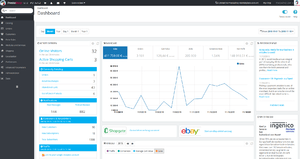PrestaShop
|
PrestaShop Logo 2015 | |
|
PrestaShop's Back Office | |
| Developer(s) | PrestaShop SA |
|---|---|
| Stable release | 1.6.1.4[1] / 6 January 2016 |
| Written in | PHP |
| Type | Webshop |
| License | Open Software License version 3.0 |
| Website |
www |
PrestaShop is a free, open source e-commerce solution. The software is published under the Open Software License (OSL). It is written in the PHP programming language with support for the MySQL database management system.
PrestaShop is currently used by 250,000 shops worldwide and is available in 60 different languages.[2]
History
PrestaShop started in 2005 as a student project within the EPITECH IT School in Paris, France. Originally named phpOpenStore, the software was first available in two languages: English and French. Three months after its launch the project was translated in thirteen languages.
The company, PrestaShop SA, was founded in 2007 by Igor Schlumberger and Bruno Lévêque.
Between May 2010 and April 2012, PrestaShop grew from 17 employees to more than a hundred, with the establishment of secondary headquarters in Miami.[3]
In March 2014, PrestaShop SA secured $9.3M in Series B Funding to continue its global expansion efforts.[4]
In January 2015, the company launched PrestaShop Cloud, a free self-hosted version of its software.[5]
According to technology tracking website BuiltWith.com, the market share of PrestaShop for open-source e-commerce websites is 9%.[6] According to W3Techs, PrestaShop is used by 0.5% of all websites.[7]
Business model
As an open-source organization, PrestaShop is faced with the challenge of generating revenues. By leveraging the size and international scope of its open-source community, the company established two main sources of revenue:
- PrestaShop Addons, a marketplace through which merchants purchase custom addons and themes for their stores
- Strategic partnerships with e-commerce industry leaders such as PayPal or Google[8]
Features
PrestaShop has more than three hundred built-in features for managing product listing, payments, shipping, manufacturers and suppliers. PrestaShop uses a web template system which allows users to customize store themes and add new features through add-on modules. The PrestaShop Addons marketplace provides a platform for third-party developers to sell themes and modules to merchants.
Themes
PrestaShop provides a basic responsive theme by default. Users can install or develop their own themes which change the display of the website without altering its content.
Modules
Add-on modules extends the software built-in functionalities. Users may install modules directly within the software administration panel or develop their own.
See also
- Comparison of shopping cart software
- Comparison of free software eCommerce web application frameworks
- List of online payment service providers
References
- ↑ "Changelog in version 1.6.1.4 - stable". prestashop.com. Retrieved 6 January 2016.
- ↑ "About PrestaShop". PrestaShop.
- ↑ "PrestaShop Opens First U.S. Office & Creates 85 Jobs in Miami".
- ↑ "PrestaShop raises $9.3M in Series B Funding".
- ↑ "PrestaShop disrupts the ecommerce market with the industry’s first free cloud software for merchants". PrestaShop.
- ↑ "Statistics for websites using Open Source technologies". BuiltWith.
- ↑ "Usage statistics and market share of PrestaShop for websites". W3Techs.
- ↑ "E-commerce Industry Partners". PrestaShop.

